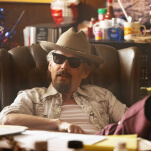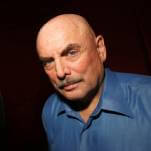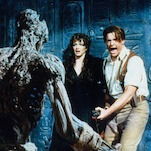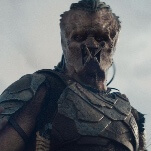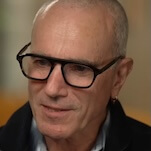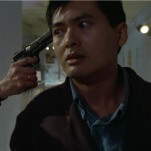No portrayal of Dr. Jack Kevorkian — not even ones that (like tonight's HBO documentary Kevorkian, and You Don't Know Jack, the same network's biopic that aired only a few short months ago) dearly want to lionize the man — seems to be able to present a completely positive picture of him. The more you learn about the tireless advocate for physician-assisted suicide, the more it seems clear that this is probably by design.
The image that emerges from Kevorkian is that of a man who is convinced that he is fighting one of the great moral battles of his time. And it's entirely possible that he's right about that. But like many other people convinced of the rectitude of their cause, he thinks that being right is enough, and the lesson that emerges from Kevorkian is that being right — under the best of circumstances, but particularly in contemporary, image-driven America — is not enough. Director Matthew Galkin clearly believes in what Kevorkian has done, and wants his subject to come across as moral crusader and visionary, but he's frustrated at every turn by the man himself.
Galkin, who spent a year in the good doctor's company, doesn't go for much in the way of camera trickery or visual fireworks; he lets his subject speak for himself in his distinctive voice, regardless of the fact that doing so can backfire as often as it works to his benefit. "Do I look like I'm sorry for what I did?", Kevorkian grumbles in a way that's a challenge to both his detractors and himself. The director takes pains to show us that Kevorkian is a regular Renaissance Man: he's an author, a poet, a painter, a composer, and a man comfortable discussing everything from history to literature to the law.
In fact, there are moments where the film almost crosses over into hagiography: Mike Wallace, whose 60 Minutes interview with Kevorkian helped land the doctor in jail, appears to lend his full support to the man and his cause. His former attorney, Geoffrey Fieger, likewise shows up to discuss the difficulties the two men faced both during and after their time together, but he reiterates his total commitment to Kevorkian's work.
It's the appearance of Fieger, though, that really brings home the stubborn, single-minded, PR-unfriendly nature of the documentary's subject. Fieger rather famously launched an ill-fated political campaign in the midst of defending Kevorkian; apparently learning nothing from that experience, Kevorkian himself launched a similar — and similarly doomed — campaign. He also discusses other failed projects of his, including an attempt to film Handel's Messiah that ended in utter financial disaster, and his quixotic efforts in the fields of poetry and music (he's much more successful as a painter, albeit in ways that only serve to further enrage his opponents).
But at every juncture where it seems like the public Jack Kevorkian will be sabotaged by the tone-deaf arrogance of the private Jack Kevorkian, the sheer moral character of the man is made manifest. To hear him tell it — and he's got an extremely adept layman's grasp of the law — his time in prison was less the final victory of an overzealous prosecutor and more part of his own overall strategy to get more press for his cause. Hearing him discuss how he watched people close to him, his mother and sister, die in helpless, terrible pain leaves almost no room for doubt as to why he so passionately pursues his cause. And his expertise and emotion when discussing the Armenian genocide that claimed many of his family members are the signs of a man who knows far too much about human suffering, and sees no reason why it has to continue in those with the power to end it.
Galkin comes to praise Kevorkian, but gives us enough space to bury him — or to watch him bury himself. The fact that he doesn't is a testament to his strength and commitment as a public figure, and a worthy subject for HBO's documentary series, which has served up some fine entries so far.
Rating: B+
Stray Observations:
– Jack Kevorkian is now 82 years old, and spent almost his entire seventies in prison. He was hardly idle, though — he spent months at a time communicating with people on the outside who sought his services and attempting to aid them when he couldn't help directly. He also receives glowing praise from his fellow inmates, many of whom received legal counseling and other forms of assistance from him.
– If you're opposed to Kevorkian's ideas, it's really easy to see how you might not just disagree with him, but actually hate him. He's shamelessly open about what he does, totally remorseless in the way that only someone who genuinely doesn't believe he's done anything wrong can be, and a tricky bastard to the end: he essentially gamed the legal system to get an early release from jail.
– Kevorkian's primary goal these days is to live long enough to see his cause receive a Supreme Court hearing. With major changes afoot in the court — see today's news — he might just get there.

